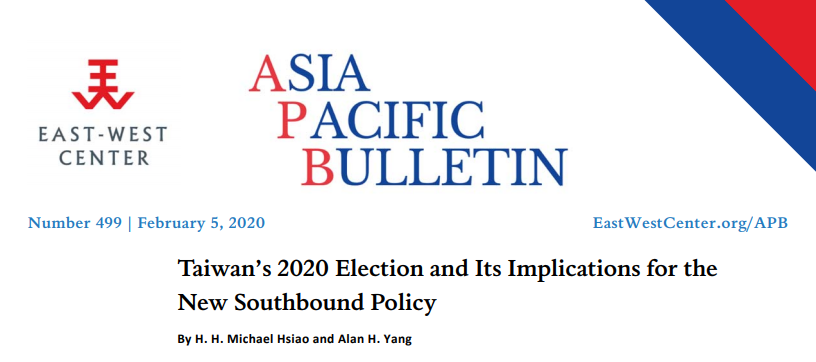The elecƟons in January 2020 marked a new era for Taiwan, clearly demonstrating citizens’ resistance to China. The results showed that incumbent President Tsai Ing‐wen, leader of the Democratic Progressive Party (DPP), was re‐elected with a landslide victory of 8.17 million votes (57.1%) which is higher than the previous record high of 7.65 million votes obtained by the Kuomintang (KMT) President Ma Ying Jeou in 2018.
Although KMT presidential candidate Han Kuo‐Yu failed to win the elecƟon, he also obtained 5.5 million votes (38.6%), surpassing the 3.81 million votes obtained by the KMT’s Zhu Lilun in 2016.
President Tsai Ing‐wen overwhelmed the KMT by more than 2.5 million votes. Han only won in Hualien, Taitung, Hsinchu, Miaoli, Kinmen, and Mazu out of 22 counties and cities. Regarding the legislative election, the DPP is also in control of the majority in the Legislative Yuan with 61 seats (53.98%). The 2020 election result shows that the Taiwanese people are giving President Tsai Ing‐wen and her administration a second term to lead the country.
The results of the 2020 election in Taiwan have four strategic meanings, including for the New Southbound Policy, which can be summarized into three “D”s.
First, the Taiwanese people collectively decided the future of Taiwan in a democratic manner. It is also a kind of democratic deterrence, showing that the majority of people are fighting against China’s infiltration and political influence. The electoral decision also rejected the “One‐China, Two System”doctrine unilaterally imposed by PRC President Xi JinPing on Taiwan.
Second, the Taiwanese people firmly defended Taiwan’s sovereignty and cherished democracy through free and open elections, as well as securing their current lifestyles and the social order of the country.
Third, the result also showed Taiwan’s government and its citizens are determined to uphold the value of its own existence as a responsible middle power willing to share its development experience and demonstrate soft power to the world.
The election results also demonstrate a reinforcement of some key elements of Taiwan’s foreign policy which can be best understood by three “C”s.
First, Taiwan will continue to act constructively as a responsible stakeholder. Although China keeps squeezing Taiwan's diplomatic space and does everything to force Taiwan to accept the doctrine of “One Country, Two Systems”, Taiwan will not be passive and will instead reinforce its role as a global stakeholder devoted to international and regional development and progress. Today, the world is threatened by China's Coronavirus crisis outbreak originating in Wuhan city. No country is immune from this epidemic. However, Taiwan, despite its geographic proximity to the affected area, is politically blocked by China from the World Health Organization (WHO) and the global epidemic governance network. In late January 2020, Japan and Canada and other like‐minded countries have publicized their support for Taiwan's participation and inclusion in the global epidemic governance network.
Second, the re‐election of President Tsai demonstrates Taiwan’s commitment to Asia and to the world. This commitment will definitely contribute to the reinforcement and continuation of President Tsai’s signature foreign policy initiative, that is, the New Southbound Policy (NSP). The NSP’s people‐centered rationale has already been welcomed by the international community, including Taiwan’s Asian neighbors. The reinforced NSP (or NSP 2.0) would enlighten Taiwan’s multifaceted engagements to the regional community and highlight Taiwan as an integral part of world development. President Tai's second term will face ongoing complex global power struggles and geopolitical and economic competions. Taiwan must be more united and stable, bolstering its own status as it carries out the NSP.
Finally, the re‐election of President Tsai will actively foster the connectedness between Taiwan and global civil society. Although Taiwan’s diplomacy is facing severe difficulties under China’s political pressure and efforts at isolation, Taiwan’s government will continue to strengthen its links with other partners through the people‐centered NSP and by means of effective and diverse public diplomacy mechanisms. A stronger Taiwan will consolidate the process of regional integration in Asia through the pursuit of innovation, progress and development for all.
During her first term, President Tsai Ing‐wen adopted a responsible attitude that did not shy away from China, and she urged communication and dialogue. In her acceptance speech after her January 2020 reelection victory, she articulated the four principles of peace, parity, democracy, and dialogue to be the foundation for cross‐strait interactions. While Tsai’s second term as president may not witness an easy and open improvement in cross‐strait relations, NSP surely will be Taiwan’s necessary and effective foreign policy mechanism to expand its international visibility and favorability.
The second term of Tsai’s Presidency is highly anticipated by the Taiwanese people for even greater progress, unity, and stability. A democratic and united Taiwan is the most effective antibody against the PRC’s hegemony in Asia and the world and this island country’s sustainable development serves as an important living case for Asia’s progress.
H. H. Michael Hsiao and Alan H. Yang are Chairman and Executive Director of the Taiwan‐Asia Exchange Foundation in Taiwan. They can be contacted at Michael@gate.sinica.edu.tw and museiniir@gmail.com.
This article was published on Asia Pacific Bulletin by East West Center.
